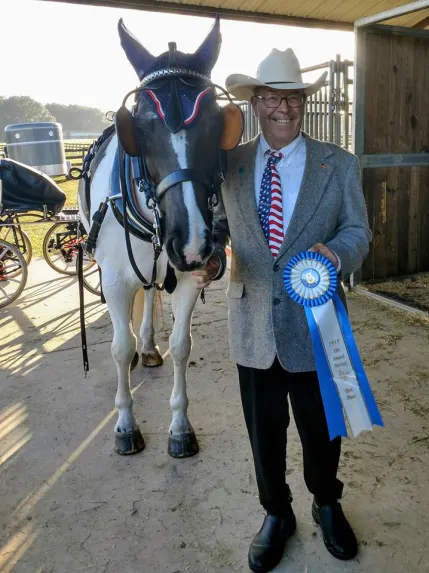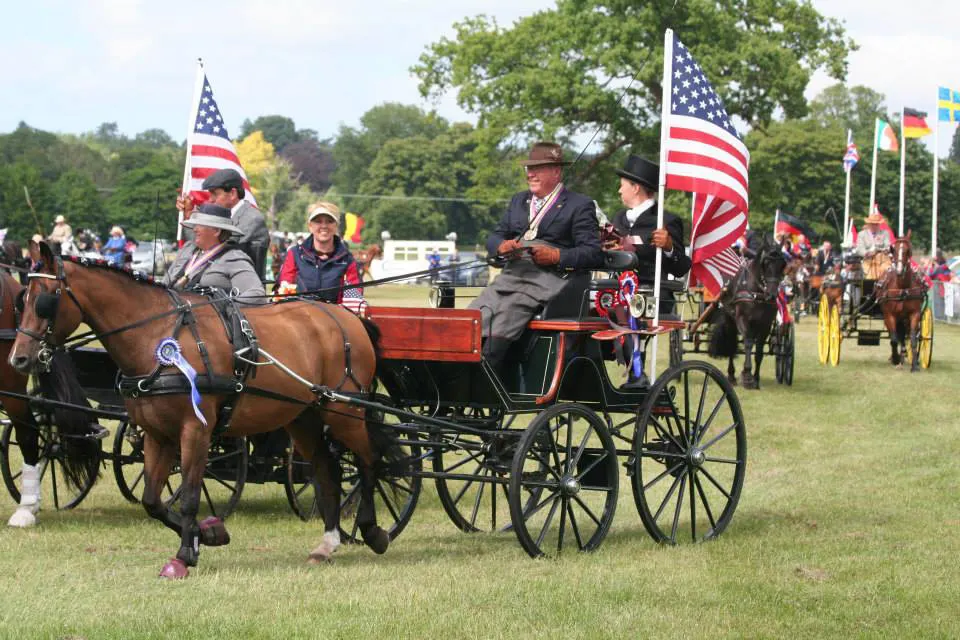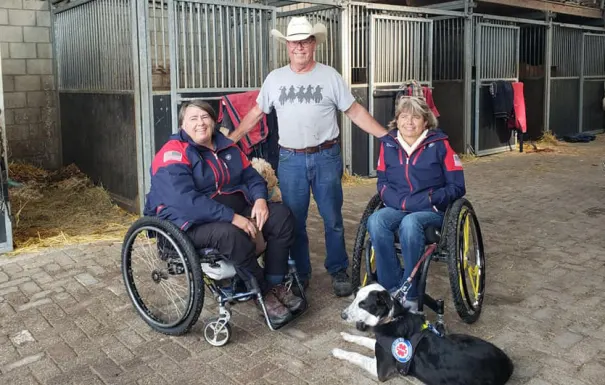It was late spring in 2019 and Brenda Giles hadn’t left the hospital in days. Her “adrenaline junkie” husband, Bob Giles—a man who came home from Vietnam with three Purple Hearts, who had been a Maine police officer for 22 years, and who had made a name in the carriage driving world for his way with problem horses—now lay beside her in his hospital bed completely immobilized.
An operation meant to improve Bob’s quality of life had gone horribly wrong. The surgeons had set out to stabilize cracked vertebrae in Bob’s neck, but a screwdriver slipped and impaled Bob’s spinal cord in the process. A millimeter-sized mistake had ended life as Bob knew it, including, it seemed, his career as a combined driving trainer, judge and clinician. He woke from surgery with an unbearable prognosis: He was paralyzed from the neck down.
Brenda remembers one of his many friends coming to visit while she kept vigil at Bob’s bedside at the James A. Haley Veterans’ Hospital in Tampa, Florida. The friend had come to wish Bob well, but he also couldn’t help himself: He had a problem with his wheelers, the rear horses in four-in-hand driving. Bob was out of commission himself, but he still had a wealth of knowledge. Would he mind giving a friend some advice?
“As Bob is telling him how to keep his wheelers honest, his hands were moving,” Brenda said, remembering her disbelief. “It brought tears to my eyes, because that was the first movement we had seen. And I knew: The horses would bring him back.”
That day in the hospital bed, when Bob’s hands moved to drive an imagined horse, was just the start of an unlikely recovery. Through some combination of muscle memory and determination, Bob since has regained mobility in limbs that he cannot actually feel.
“When he was in therapy, he asked me to bring down his whip,” Brenda said. “He was in his power chair, and he would go out in this little area they had for veterans, and he would sit there, whipping the tree!”
Bob was determined to return to his life with horses, a goal that pushed him to defy the doctors’ grim predictions. In a turn that Brenda said can’t be fully explained medically, Bob has regained his ability to walk, to drive a car and, perhaps most shockingly, to pick up his carriage horse’s reins again.

Today, four years after his surgery, Bob is considered an “incomplete quadriplegic,” meaning that he is numb below the neck but has some mobility despite the paralysis.
And just as they did following his surgery, the horses still keep Bob moving. The 75-year-old Morriston, Florida, resident continues to teach driving clinics, judge horse shows and even brought home a team silver in August from the 2023 FEI Para Driving World Championship for Singles in Exloo, the Netherlands. Horses have been so embedded into Bob’s life that he’s still able to work them based on his body’s instinct rather than feeling.
A Friend At Every Farm
His botched surgery and subsequent recovery wasn’t the first time that Bob has been saved by horses. He grew up near Lubec, Maine, as a ward of the state. He and his siblings were removed from their biological parents’ alcoholic household, and he spent his childhood continually uprooted. The state shuffled Bob between 13 foster homes, where he was often treated more like hired help.
In that rural part of Maine in the 1950s, he says that farmers didn’t have much—but luckily for Bob, they did have horses.
“Downeast Maine was very poor, and they couldn’t afford tractors,” Bob said. “Everybody had draft horses, so I had a friend waiting for me at every farm.”
Bob would go on to have a long and full career driving horses, but his first day on the job was, technically speaking, a disaster. The young boy had been charged with driving his foster father’s large draft horse, a flea-bitten gray Percheron named Doll, to harvest hay. Bob was so small that they mounted a block to the hay rake so he could reach the pedal to dump the hay.
“I drove the hay rake for the first time and, as it happened, it was my very first runaway because we hit a hornets’ nest,” Bob said. “The horse took off, flipped me off the rake.”
Bob remembers dusting himself off as they calmed the mare and righted the hay rake. They walked Doll to the shoreline to cake her stings in cool mud, then everyone removed their rawhide shoelaces to patch the broken harness together. As Bob’s nerves settled and they got back to work, he processed the turn of events in his young mind.
ADVERTISEMENT
“You know, I was scared,” he said. “But on the other hand, it was pretty damn exciting.”
That unlucky day in the woods is a fond memory for Bob. It was also the start of using horses as a way of shifting his perspective.
In many of the foster homes where Bob was placed, the consequence for “bad behavior,” like wetting the bed or tussling with the school bully, was going out with the horse to gather and haul wood. But Bob simply couldn’t see working with horses as any kind of punishment. As a kid who lived by the changing rules and whims of strange adults, the farm horses were a constant and a sanctuary.
“I had no control in my life,” Bob said. “But just with a whisper, I could make a horse do my bidding.”
Healing Trauma Through Horses
Bob was in awe of the gift that horses gave him to speak in a whisper. That was an important lesson in kindness for a boy coming up in foster care because Bob had, in his words, an “anger problem.”
Once he aged out of one system, he entered another: Bob joined the military in 1968 and was deployed to Vietnam. On his first day overseas, he was injured in one of the war’s most infamous battles, the Battle of Khe Sanh. Bob would sustain two more injuries over his service before returning home with severe hearing loss and X-rays that showed a jumble of pins, rods and plates used to fuse together what the rocket and grenade injuries had shattered.
Bob’s homecoming was also marred by a stiff anti-war sentiment, which brought the young man’s long-held anger to a boiling point.
“It hurt worse to get spit on than it did to get wounded,” Bob said. “So that anger needs to be dispersed somehow, and luckily I had the horses in my life.”
As he navigated recovery from his physical injuries and post-traumatic stress disorder, Bob and many of his comrades began counseling. He remembers a counselor taking notice of Bob’s passion for horses and pushing the veteran to think of his work with horses as a way to heal.
“Everybody needed counseling,” Bob said. “So I went to my first PTSD meeting and my counselor said, ‘Don’t ever come back.’ Because I had horses in my life, I dealt with the anger and all the emotions that come up in a combat situation.”
Bob built a life following the war, getting a degree in animal husbandry from the University of Maine, and continuing his equine education through a job at a Quarter Horse farm. When he began his decades-long career as a police officer, Bob still managed a large boarding barn, trained driving horses and gave frequent sleigh and hay rides.
Brenda and Bob met 27 years ago when he showed her a horse trailer he was selling. She didn’t buy the trailer—but she did agree to go dancing. Brenda was an established horsewoman in her own right, with a barn full of Paso Finos. Eventually, the pair decided to move to Florida where they could escape Maine winters and work with horses year-round. Brenda also encouraged Bob to narrow his focus to his passion for combined driving.
“She said, ‘When we move to Florida, you are going to take the piece of the training pie that nobody else wants,’ ” Bob said. “And so I chose traumatized horses: Runaway? Fall over backwards? Oh, send them to Bob!”
As a child, Bob had fallen in love with his foster families’ work horses because of the way a whisper could move a one-ton animal. Now, he worked with horses who had had that agreement abused—where handlers had asked too much, too loudly, and damaged the animals’ trust in humans.
At their farm in Morriston, Florida, Bob slowly rebuilt relationships with those horses. He imagined how traumatized animals interpreted information through humans and renegotiated that conversation, making his aids as fair and quiet as possible.
ADVERTISEMENT

“Your reins are just like electricity,” he explained. “An ounce on your finger is a pound in their mouth. If you move your rein one inch, you move your horse one foot. I wouldn’t want somebody pulling on my mouth for an hour and calling it a good time. So I try to drive 90% voice command, 10% reins.”
What struck Bob again and again about the horse-human relationship, over the countless horses he worked with, is how capable abused animals were of trusting again. When he talks about their willingness even today, his voice cracks with emotion.
“Every horse that I have driven would die for me just by asking,” he said. “Every time I pick up my reins, I close my eyes, and I say, ‘I will keep you safe.’ ”
‘The Luckiest Man On Earth’
To an outsider, there’s nothing about Bob’s path that seems especially charmed. He grew up neglected and angry as a ward of the state, endured a thankless and difficult tour of Vietnam, and he has lived decades with daily reminders of his combat injuries—including loss of 90% of his hearing and most of the mobility in his right arm. And that’s all before the surgery that accidentally paralyzed him at age 71. But Bob won’t accept anyone’s pity.
“You’re talking probably to the luckiest man on earth,” Bob said. “I have the ability to shape how many people’s lives, and help how many horses?
“If you really love horses, you want to help horses—maybe you disagree with the way the show ring goes—you become a clinician, a trainer or a judge,” he continued. “Because what I say, and what I write down, people are going to go home and do. So it’s very, very humbling. I affect thousands of lives every year.”
Despite his rough start in life, Bob didn’t choose horses to escape from people. A large piece of what he loves about the horse world is connecting with the humans who also care about these animals.
Because of the horses, he’s developed deep relationships with his navigators, other drivers and horse owners. The horse community has shown up for Bob by visiting him in the hospital, helping him with physical therapy (like the friend that taught him jiu jitsu moves) and lifting his newly paralyzed body into his carriage for his first drive post-surgery.

He is especially moved that people have entrusted him with their beloved horses. When Dutch horse owner Chantel Vermerris offered to lease Bob her Welsh Cob Brynithon Flyers Magic for the 2023 World Championships, the agreement made it possible for Bob to participate with a competitive partner. The expense of flying his own horse over from the U.S. would have been prohibitive.
“Luckily I’ve had horses in my life, and people willing to trust me to say, ‘You can take the love of my life and try to win,’ ” Bob said. “Hundreds of people have let me drive their animals, and said, ‘Here: Try.’ ”
Bob was humbled by Vermerris’ show of generosity, as he is of the grassroots efforts that many have made to support his passion. Hundreds of people, some strangers, chipped in to get Bob to the Netherlands in 2023, when his friends championed a crowdfunding effort to support Bob’s path to the world championships.
“Hundreds of people put me there,” he said. “People that couldn’t afford to sponsor me would spend $5, $10, $100—whatever they could.”
Bob has come a long way from those lonely days as a foster child in Downeast Maine. The life he built from scratch is one he’s grateful to be living, in spite of the hard days.
“You know, I have had a great life. I have driven thousands of great horses, drove fast, got in fights, drank beer. I’ve got hundreds of friends, and they never had a day without pay,” Bob said with a chuckle. “So I don’t feel the need to enlighten the world that maybe I don’t feel good today.”






